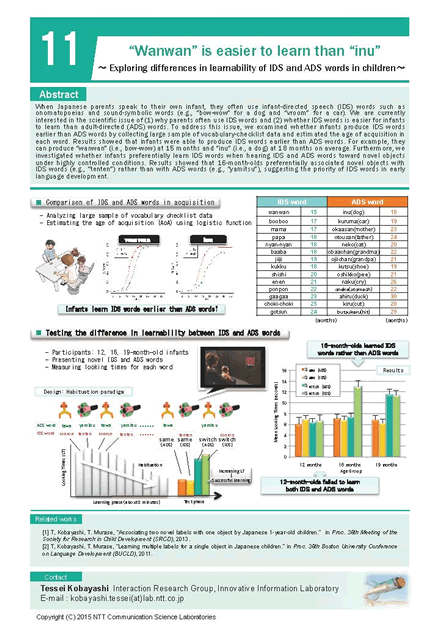
Computer Science
"Wanwan" is easier to learn than "inu"
- Exploring differences in learnability of IDS and ADS words in children -

Abstract
When Japanese parents speak to their own infant, they often use infant-directed speech (IDS) words such as onomatopoeias and sound-symbolic words (e.g., “bow-wow” for a dog and “vroom” for a car). We are currently interested in the scientific issue of (1) why parents often use the IDS words and (2) whether the IDS words is easier for infants to learn than the adult-directed (ADS) words. To address this issue, we first examine whether infants produce the IDS words earlier than the ADS words by collecting large sample of vocabulary-checklist data and estimated the age of acquisition (AoA) in each word. Results showed that infants were able to produce the IDS words earlier than the ADS words. For example, they can produce “wanwan” (i.e., bow-wow) at 15 months and “inu” (i.e., a dog) at 18 months on average. Furthermore, we investigated whether infants preferentially learn the IDS words when hearing the IDS and ADS words toward novel objects under highly controlled conditions. Results showed that most of the 16-month-olds preferentially associated novel objects with the IDS words (e.g., “tenten”) rather than with the ADS words (e.g., “yamitsu”), suggesting the priority of IDS words in early language development.
Photos
Poster
Presenters

Yuko Okumura
Innovation Communication Laboratory
Innovation Communication Laboratory

Ryoko Mugitani
Human Information Science Laboratory
Human Information Science Laboratory

Satoshi Nakashima
Human Information Science Laboratory
Human Information Science Laboratory





